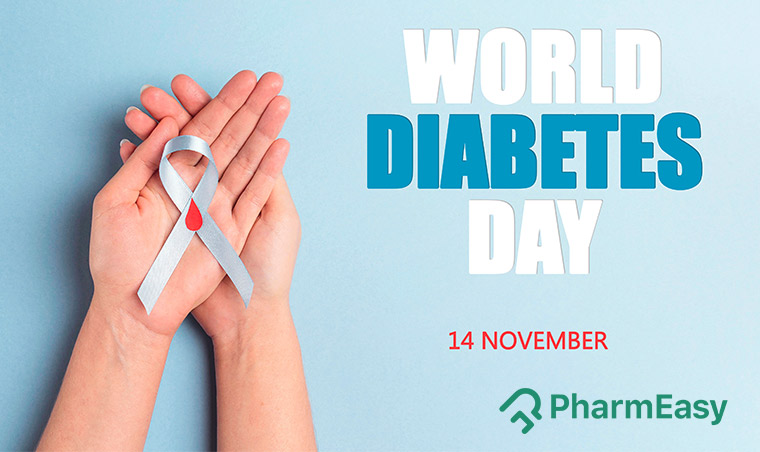World Diabetes Day: Access to Care Made Easy
By Dr. Nikita Toshi +2 more

Get,

to manage your symptom
Get your,


4 Cr+ families
benefitted

OTP sent to 9988776655



You’ve successfully subscribed to receive
doctor-approved tips on
Whatsapp

Get ready to feel your best.

Hi There,
Download the PharmEasy App now!!


Register to Avail the Offer
Send OTPBy continuing, you agree with our Privacy Policy and Terms and Conditions

Hi There,
Sign up on PharmEasy now!!
Trusted by 4 crore+ families

OTP sent to 9988776655



You have unlocked 25% off on medicines




Code: NU25



By Dr. Nikita Toshi +2 more
Every individual is entitled to good health and well-being. To ensure healthy living, accessibility to medications and other health facilities are of vital importance. Today, in many parts of the world, people do not have the opportunity to realize their needs. Drawing inspiration from this vacuum is the theme of this year’s World Diabetes Day, ‘Access to Diabetes Care: If Not Now, When?’
World Diabetes Day is celebrated around the world on 14th November, on the occasion of Sir Frederick Banting’s birthday. Sir Frederick Banting discovered Insulin in collaboration with Charles Best in 1922. This date was chosen for the launch of WDD in the year 1991 by the World Health Organization and the International Diabetes Federation.

Diabetes is hailed as a silent killer due to the health complications it brings about. Diabetes Mellitus is a chronic condition characterized by high levels of blood sugar. According to a report by the World Health Organization, more than a million deaths took place in 2019 due to diabetes. Diabetes is the major cause of heart attacks, stroke, blindness and kidney failure.
So, on the occasion of World Diabetes Day 2021, let us discuss how you can stay healthy if you are living with diabetes.
Table of Contents
When we come to the causes of diabetes, there are two types to elaborate on; type 1 and type 2.
The reason why type 1 diabetes occurs is unknown. What little can be gathered is that the immune system destroys the cells in the pancreas which are responsible for producing insulin. This leads to an insulin deficit in the body while sugar starts to accumulate in the bloodstream.
For type 2 diabetes, the causes are categorized into two which are also interrelated:
Some risk factors that can make you more prone to type 2 diabetes are as follows:
Both type 1 and type 2 diabetes have the following warning signs:
Diabetic people need to pay special care and attention to what they are putting inside their body as what you eat can spike your blood sugar level and put your health in jeopardy. It is believed that the diet plan recommended for someone with diabetes is the ideal diet plan for all for a healthier life.
While some foods will regulate your blood sugar levels, and keep inflammation under control, others will do just the opposite and put you at risk of diabetes-induced health complications. Some of these are:
Whether you have type 1 or type 2 diabetes, exercising regularly is highly recommended to keep both your weight and blood sugar under control. Here are 5 easy exercises that you can easily incorporate into your daily regime for about 30 minutes or so.
Diabetes if left untreated can be lethal and complicated. It can either directly or indirectly weaken your bodily system. Below are some ways that diabetes can slowly break down your organs.
If you are living with diabetes, a few lifestyle tweaks can keep you safe, healthy and out of unnecessary complications.
Diabetes is a complicated condition but one that can be kept under control. To lead a healthy life with your family, here is what you should do.
In case of any emergency or treatment-related inquiry, you can call on the following toll-free number: 1800 121 2096.
Living with diabetes can be stressful and frustrating at times due to the number of dietary restrictions one has to follow every day but rest assured that it is possible. With proper emotional and mental support from your loved ones, you can lead a healthy and normal life. Furthermore, due to the active efforts on the part of the government to spread awareness and the wider availability of medications provided by online pharma giants such as PharmEasy, buying medications and other diabetes-related kits and essentials have become easy, fun and less time-consuming.
Disclaimer: The information provided here is for educational/awareness purposes only and is not intended to be a substitute for medical treatment by a healthcare professional and should not be relied upon to diagnose or treat any medical condition. The reader should consult a registered medical practitioner to determine the appropriateness of the information and before consuming any medication. PharmEasy does not provide any guarantee or warranty (express or implied) regarding the accuracy, adequacy, completeness, legality, reliability or usefulness of the information; and disclaims any liability arising thereof.
Links and product recommendations in the information provided here are advertisements of third-party products available on the website. PharmEasy does not make any representation on the accuracy or suitability of such products/services. Advertisements do not influence the editorial decisions or content. The information in this blog is subject to change without notice. The authors and administrators reserve the right to modify, add, or remove content without notification. It is your responsibility to review this disclaimer regularly for any changes.

Leave your comment...

View all comments(2)
Nice information
Thank you, glad you liked it.